MIG
Mozilla InvestiGator

Distributed and Real-Time Digital Forensics at the Speed of the Cloud
Julien Vehent, Operations Security
|
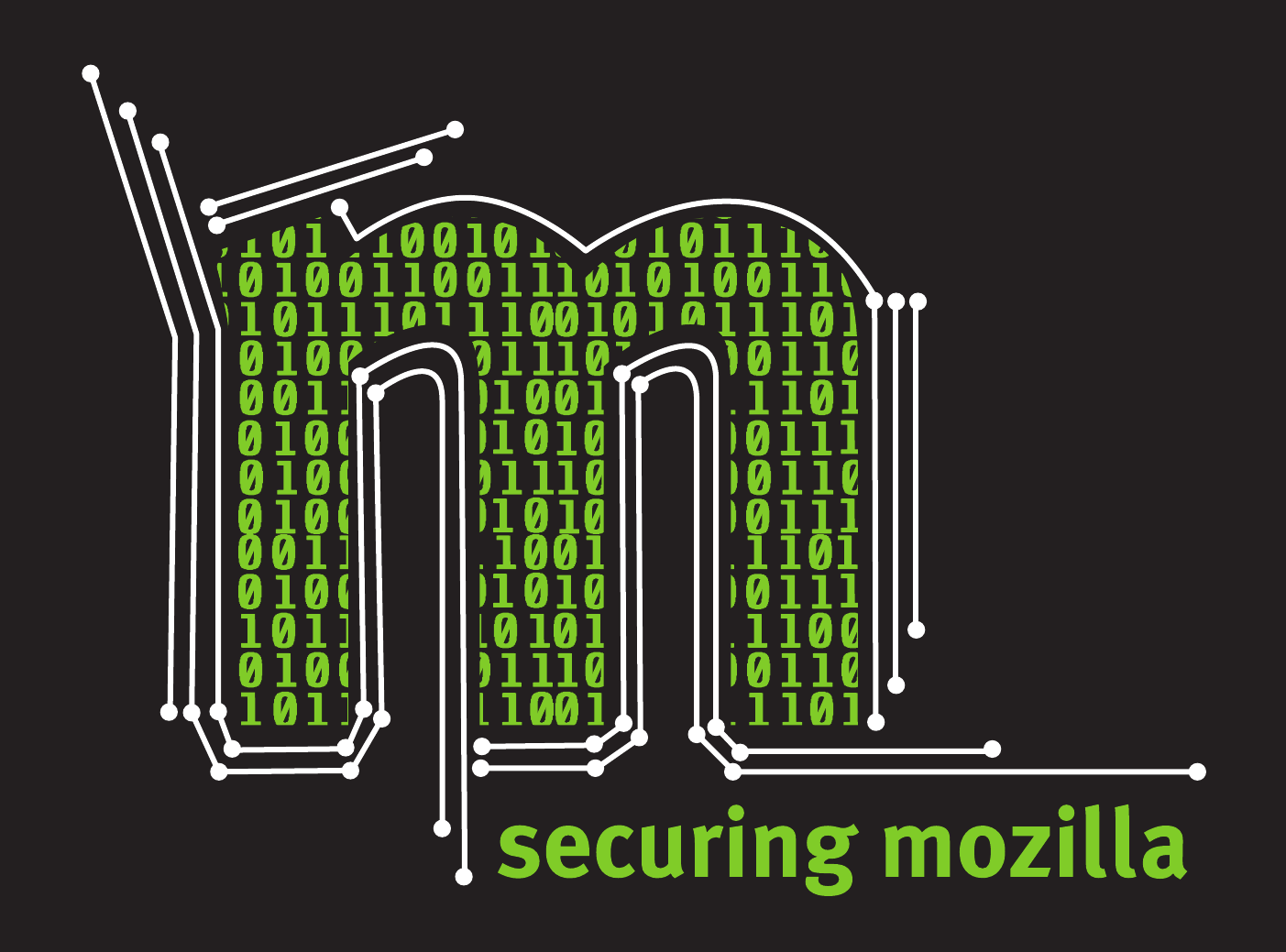
|
A post-APT1 security world
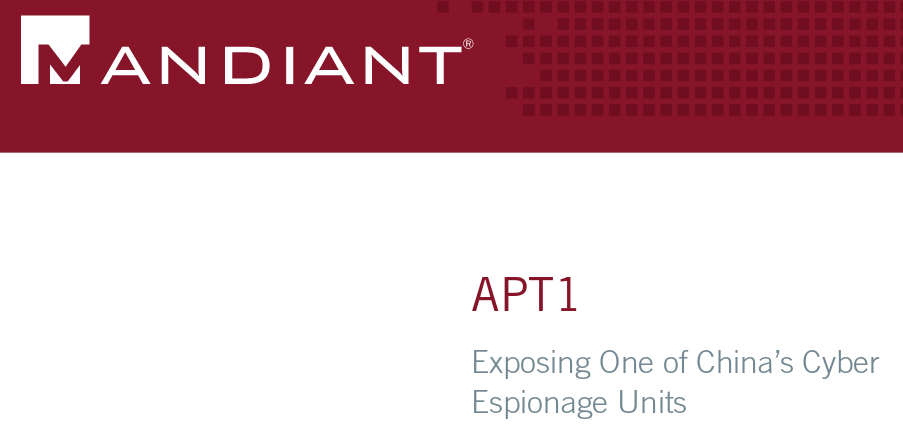
3ce55c6994101faec00b5b7c2fee494f
That unfortunate commit...
git commit -a . && git push github master


$ mig file -path / -name "^\.boto$" -content "abcdef123456" -size "<1k" -maxdepth 5
We're building a better Internet



Strong startup/incubator mindset
- Experiment & fail fast
- Minimalistic centralization
- Everyone can write and host a website...
- ...sometimes using operational standards
Security at the perimeter doesn't work when your infrastructure lives all over the internet
- 400+ active websites & services
- a dozen offices, hundreds of remotees
- 2 datacenters, tons of AWS accounts, heroku, rackspace, ...
all loosely connected only when needed
Incident Response at Mozilla

Need for a strong
Operations Security group
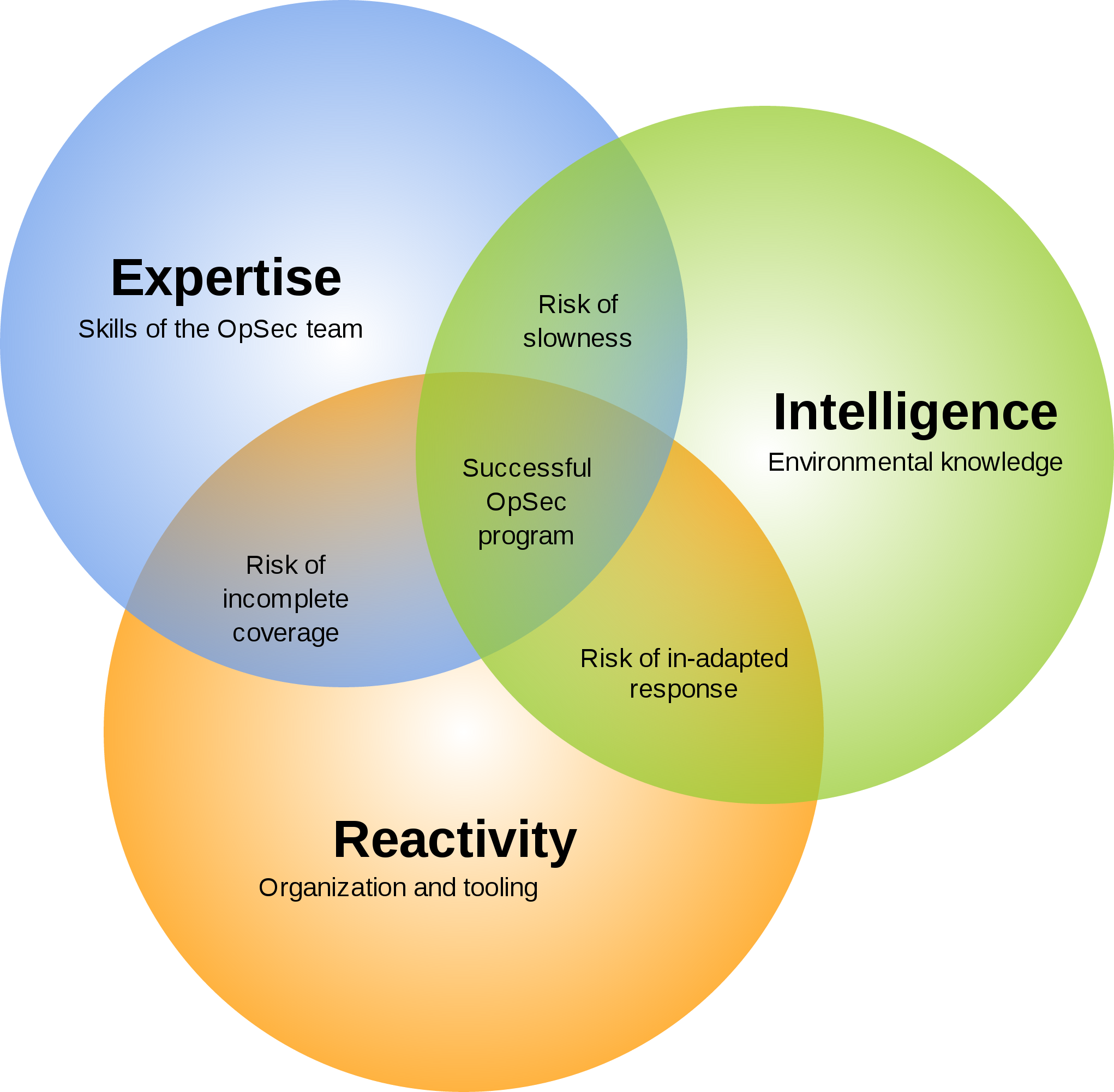
3 OpSec problems
| Visibility | too many systems doing too many things in too many ways. Need to see them all. |
| Reachability | we don't have accounts or network accesses to all systems. |
| Heterogeneity | every snowflake system is investigated in its own special way. |
99% of investigations are simple
- "Hey Systems, seen that <file|ip|process|user> lately?".
- "Nope"
- "Nope"
- "Nope"
- "Oh yeah, just yesterday!" <--- OMG DEFCON 1!!!
The faster we run investigations,
the more we will investigate.
- bob left the company, did we revoke all his accesses?
- massive libstuff1 vulnerability, is it used anywhere?
- found IP 13.37.66.66 brute forcing the VPN, check other nodes to see if it's connected
- jean-kevin put some AWS key on pastebin, is it configured anywhere?
- anyone remembers that weird host that was running an anonymous proxy?
We couldn't find a tool we liked,
so we built one

Demos!

Locating a cron job that contains a password
Basic investigation workflow
Got any private keys in those home folders?
Is that botnet IP connected anywhere?
Scan processes memories for a regex
Digital forensics on steroids
Massively Distributed means Fast.
Simple to deploy and Cross-Platform.
Secure! Don't trust until you verify.
Don't spy on data, respect Privacy.
Massively distributed
Central platform only passes messages around.
Investigation & computation is done on the agents.
Small infrastructure footprint
means easier to deploy and operate.
Simple to deploy
One static binary, no dependencies.
Configuration is built-in or deployed via provisioning.

As secure as PGP, so pretty good
{
"name": "locate bad actor",
"target": "mode='daemon'",
"validfrom": "2015-05-27T00:29:29.038012Z",
"expireafter": "2015-05-27T00:30:59.038012Z",
"operations": [
{ "module": "file",
"parameters": {
"searches": { "s1": { "paths": ["/etc/cron.d"],
"contents": ["badpassword"]
}}}}
],
"pgpsignatures": ["wsBcBAABCAAQBQJVZRAlCRCj1lIXO3..."],
"syntaxversion": 2
}
Privacy: I used to be a spy...
|
Doing forensics without full access to all data is hard, but not impossible. Agents do the work and return answers without raw data. |

|
Internals
REST API receives signed JSON messages
distributed to agents via RabbitMQ
and stored in a Postgres database.
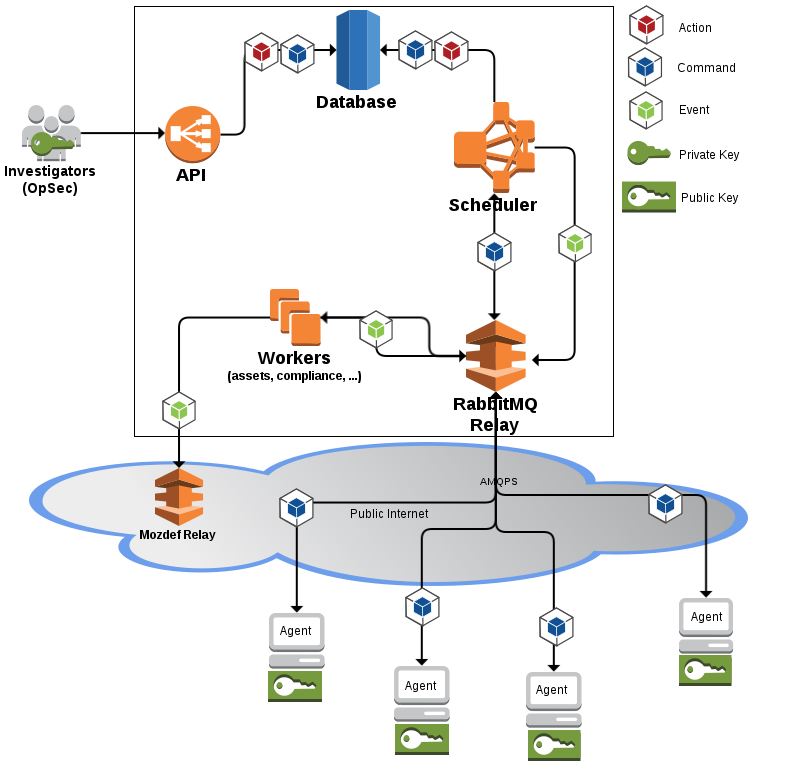
Architecture of the Agent
+-------+ [ - - - - - - A G E N T - - - - - - - - - - - - ]
|command|+---->(listener)
+-------+ |(2)
^ V
|(1) (parser)
| + [ m o d u l e s ]
+---------+ | (3)|----------> op1 +----------------+
|SCHEDULER|+---+ |------------> op2 +--------------|
| |<---+ |--------------> op3 +------------|
+---------+ | +----------------> op4 +----------+
| V(4)
|(6) (receiver)
| |
| V(5)
+ (publisher)
+-------+ /
|results|<-----------------------------------------
+-------+
Security of the Agent
Agent only runs something if these conditions are met:
- action has valid PGP signatures
- issued by trusted investigators
- with ACL accesses to a given module
multiple signatures required to run sensitive modules
Agent ACLs
var AGENTACL = [...]string{
`{ "file": { "minimumweight": 2,
"investigators": {
"Alice": { "fingerprint": "E60892BB..", "weight": 2 },
"Bob": { "fingerprint": "AD595634..", "weight": 2 } } }
}`,
`{ "memory": { "minimumweight": 3,
"investigators": {
"Alice": { "fingerprint": "E60892BB..", "weight": 2 },
"Eve": { "fingerprint": "F6D781AE..", "weight": 1 } } } }
}`,
}
Agent ACLs
The weights of each investigator providing a valid signature are summed, and if the total weight is equal or higher than the minimum weight, the operation is considered valid.
TotalWeight = Weight[Alice} + Weight[Bob]
if TotalWeight >= MinimumWeight { run module }
Security of the platform: API
REST API, uses IdFix PGP Token authentication
curl -H 'X-PGPAUTHORIZATION: 1;2015-05-28T15:04:05Z;111;owEBYQGe/pANAwAIAaP...' https://api.mig.example.net/api/v1/
PGP already needed to sign actions
A PGP Token avoids needing another username/password.
Security of the platform: Database
Typical PostgreSQL protections (TLS, credentials, GRANTs)
Minimalistic attack surface:
- Investigator keys are not stored in DB
- Results are in DB but never contain raw data, minimize impact of leak
Security of the platform: Scheduler
Complex code path to move messages around BUT:
- No user interaction
- No way to tamper with signatures
Security of the platform: 
Most exposed component (public).
Requires AMQP over TLS with client certs and credentials.
Tightly controlled RabbitMQ ACLs, but hard to write/audit.
Complex investigations:
write JSON directly
many samples at
https://github.com/mozilla/mig/tree/master/actions
Example: Shellshock IOCs
{
"name": "Shellshock IOCs (nginx and more)",
"target": "environment->>'os' IN ('linux','darwin') AND mode='daemon'",
"operations": [
{
"module": "file",
"parameters": {
"searches": {
"iocs": {
"paths": [
"/usr/bin",
"/usr/sbin",
"/bin",
"/sbin",
"/tmp",
"/var/tmp"
],
"sha256": [
"73b0d95541c84965fa42c3e257bb349957b3be626dec9d55efcc6ebcba6fa489",
"ae3b4f296957ee0a208003569647f04e585775be1f3992921af996b320cf520b",
"2d3e0be24ef668b85ed48e81ebb50dce50612fb8dce96879f80306701bc41614",
"2ff32fcfee5088b14ce6c96ccb47315d7172135b999767296682c368e3d5ccac",
"1f5f14853819800e740d43c4919cc0cbb889d182cc213b0954251ee714a70e4b",
"2bc9a2f7374308d9bb97b8d116177d53eaca060b562f6f66f5dd1af71c9d7a66"
],
"contents": [
"/bin/busybox;echo -e '\\\\147\\\\141\\\\171\\\\146\\\\147\\\\164'",
"legend.rocks"
],
"names": [
"legend.txt"
]
}
}
}
},
{
"module": "netstat",
"parameters": {
"connectedip": [
"108.162.197.26",
"162.253.66.76",
"89.238.150.154",
"198.46.135.194",
"166.78.61.142",
"23.235.43.31",
"54.228.25.245",
"23.235.43.21",
"23.235.43.27",
"198.58.106.99",
"23.235.43.25",
"23.235.43.23",
"23.235.43.29",
"108.174.50.137",
"201.67.234.45",
"128.199.216.68",
"75.127.84.182",
"82.118.242.223",
"24.251.197.244",
"166.78.61.142",
"119.110.98.93",
"2.0.1.5"
]
}
}
],
"description": {
"author": "Julien Vehent",
"email": "ulfr@mozilla.com",
"revision": 201410031030
},
"syntaxversion": 2
}Visualizing results on a map
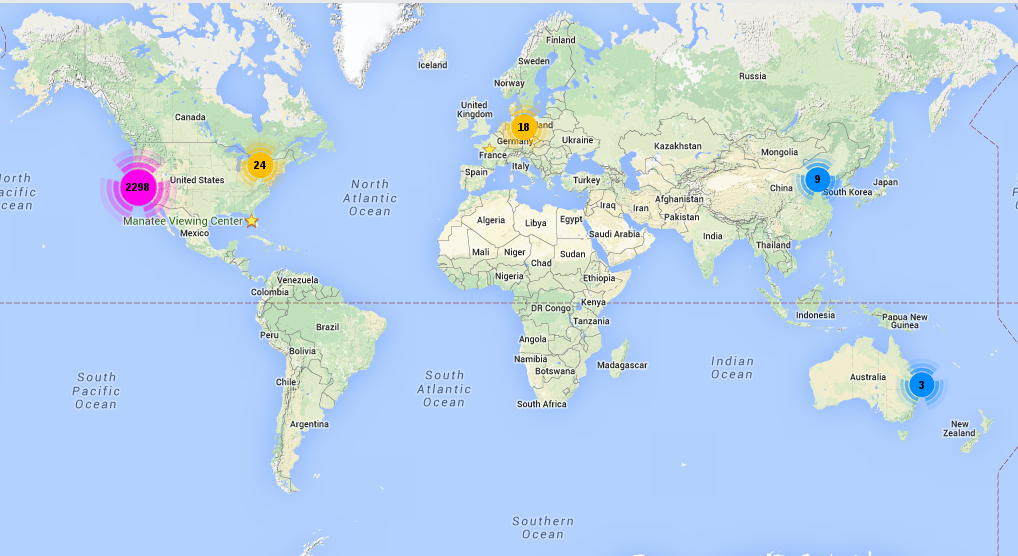
A generic security platform
- Security Compliance
- Vulnerability scanning with mozilla/mozoval
- Syscall auditing (auditd) with mozilla/audit-go
- Log inspections (OSSEC style)
- Network monitoring (distributed NSM) using GoPacket
Measuring security compliance
{
"module": "file",
"parameters": {
"searches": {
"checkforverboselogging": {
"paths": [
"/etc/ssh/sshd_config"
],
"contents": [
"(?i)^loglevel verbose$"
]
},
"checkpasswordusageisoff": {
"paths": [
"/etc/ssh/sshd_config"
],
"contents": [
"(?i)^passwordauthentication no$"
]
}
}
}
}
Storing security compliance
{
"name": "checkpasswordusageisoff",
"description": "compliance check for ssh",
"target": "server1.mydomain.example.net",
"utctimestamp": "2015-02-19T02:59:30.203004Z",
"compliance": true,
"location": "/etc/ssh/sshd_config",
"ref": "syslowremote1",
"check": {
"test": {
"type": "file",
"value": "(?i)^passwordauthentication no$"
}
"tags": {
"operator": "IT"
},
"link": "https://api.mig.example.net/api/v1/command?commandid=1424314751392165120",
"policy": {
"url": "https://wiki.example.net/ComplianceDoc/IT+System+security+guidelines",
"name": "system",
"level": "low"
}
}
}
Graphing security compliance

tl;dr
MIG is made of distributed agents securely queried from a central platform to investigate the state of large pools of systems remotely.
Questions?
## ## _.---._ .---.
# # # /-\ ---|| | /\ __...---' .---. '---'-. '.
# #| | / || | /--\ .-''__.--' _.'( | )'. '. '._ :
# # \_/ ---| \_ \_/ \ .'__-'_ .--'' ._'---'_.-. '. '-'.
### ~ -._ -._''---. -. '-._ '.
# |\ |\ /---------| ~ -.._ _ _ _ ..-_ '. '-._''--.._
# | \| \ / |- |__ | | -~ -._ '-. -. '-._''--.._.--''.
###| \ \/ ---__| | | ~ ~-.__ -._ '-.__ '. '.
##### ~~ ~---...__ _ ._ .' '.
# /\ --- /-\ |--|---- ~ ~--.....--~
# ### /--\ | | ||-\ //
#####/ \ | \_/ | \//__